What is the Main Concept of Artificial Intelligence (AI)?: In today’s rapidly evolving technological landscape, Artificial Intelligence (AI) has emerged as a transformative force with the potential to revolutionize various aspects of our lives. But what exactly is AI, and what is its main concept? In this article, we will delve into the fundamental principles of AI, its key components, and its implications for the future.
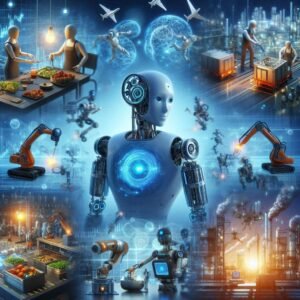
Understanding Artificial Intelligence
Definition of AI
Artificial Intelligence, often abbreviated as AI, refers to the simulation of human intelligence in machines that are programmed to think and learn like humans. These intelligent systems can perform tasks that typically require human intelligence, such as problem-solving, decision-making, and natural language processing.
Read also: Understanding the Quantum Computing Cybersecurity Preparedness Act
Main Concept of AI
At its core, the main concept of AI revolves around the idea of creating machines that can mimic human cognitive functions and perform tasks autonomously. This involves developing algorithms and models that enable machines to analyze data, recognize patterns, and make predictions without explicit programming.
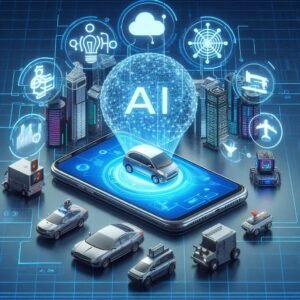
Key Components of AI
Machine Learning
Machine Learning is a subset of AI that focuses on enabling machines to learn from data and improve their performance over time without being explicitly programmed. This is achieved through the use of algorithms that allow machines to identify patterns in data and make predictions or decisions based on those patterns.
Neural Networks
Neural Networks are computational models inspired by the structure and function of the human brain. These interconnected networks of nodes, or artificial neurons, are capable of learning complex patterns from data and are commonly used in tasks such as image recognition, speech recognition, and natural language processing.
Deep Learning
Deep Learning is a specialized subset of machine learning that utilizes neural networks with multiple layers (hence the term “deep”) to learn hierarchical representations of data. Deep learning has achieved remarkable success in various domains, including computer vision, speech recognition, and autonomous driving.
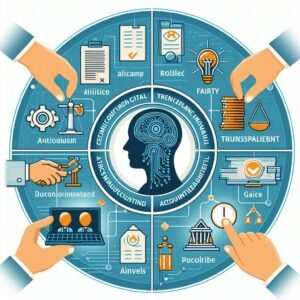
Implications of AI
Automation and Efficiency
One of the primary implications of AI is its potential to automate repetitive tasks and streamline processes, leading to increased efficiency and productivity. AI-powered systems can perform tasks faster and more accurately than humans, freeing up time for individuals to focus on more creative and strategic endeavors.
Innovation and Creativity
AI has the potential to drive innovation and creativity by enabling machines to assist humans in solving complex problems and generating new ideas. AI-powered tools can augment human intelligence and provide insights and recommendations that may not be apparent to humans alone.
Ethical and Societal Implications
AI also raises important ethical and societal considerations regarding issues such as privacy, bias, accountability, and job displacement. As AI technologies become more pervasive, it is essential to address these concerns and ensure that AI is developed and deployed responsibly, with careful consideration of its impact on individuals and society as a whole.
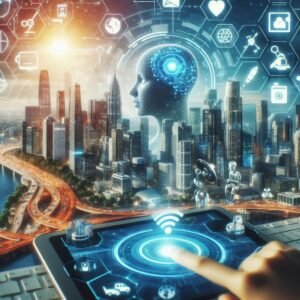
Advancements in AI
Natural Language Processing (NLP)
NLP is a branch of AI that focuses on enabling computers to understand, interpret, and generate human language in a natural and meaningful way. With advancements in NLP, AI-powered systems can now analyze large volumes of text data, extract valuable insights, and generate human-like responses in real-time. This has led to the development of virtual assistants, chatbots, and language translation services that have become integral parts of our daily lives.
Computer Vision
Computer vision is another area of AI that has seen significant advancements in recent years. AI-powered systems can now analyze and interpret visual information from images and videos with remarkable accuracy. This has enabled applications such as facial recognition, object detection, and autonomous driving, revolutionizing industries such as healthcare, automotive, and retail.
Robotics
Advancements in AI have also led to significant progress in robotics, with machines becoming increasingly capable of performing complex tasks in various environments. AI-powered robots can now navigate dynamic environments, manipulate objects with dexterity, and even interact with humans in natural ways. This has opened up new possibilities for automation in industries such as manufacturing, logistics, and healthcare.
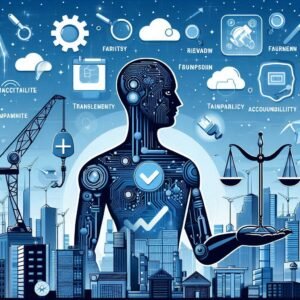
Future Trends in AI
Explainable AI
Explainable AI (XAI) is an emerging trend that focuses on making AI systems more transparent and understandable to humans. As AI becomes more pervasive in society, there is a growing need to ensure that its decision-making processes are interpretable and accountable. XAI aims to address this by providing insights into how AI models make predictions and decisions, enabling humans to trust and validate their outputs.
Edge AI
Edge AI refers to the deployment of AI algorithms directly on edge devices, such as smartphones, IoT devices, and embedded systems, rather than relying on centralized cloud servers. This allows for real-time processing of data and enables AI-powered applications to run locally without requiring constant internet connectivity. Edge AI has the potential to unlock new opportunities for smart devices, autonomous vehicles, and industrial automation.
AI Ethics and Governance
As AI technologies continue to advance, there is a growing recognition of the need for ethical and regulatory frameworks to govern their development and deployment. AI ethics encompasses principles such as fairness, transparency, accountability, and privacy, ensuring that AI systems are designed and used responsibly. Governments, industry organizations, and research institutions are increasingly focusing on developing guidelines and standards to address ethical issues related to AI.
Conclusion
In conclusion, the main concept of AI revolves around creating intelligent machines that can mimic human cognitive functions and perform tasks autonomously. By leveraging techniques such as machine learning, neural networks, and deep learning, AI has the potential to revolutionize various aspects of our lives, from automation and efficiency to innovation and creativity. However, it is crucial to address the ethical and societal implications of AI and ensure that it is developed and deployed responsibly for the benefit of humanity.
FAQs
1. What are the main goals of AI? The main goals of AI include mimicking human intelligence, automating tasks, improving efficiency, and driving innovation and creativity.
2. How does AI differ from traditional programming? Unlike traditional programming, where explicit instructions are provided to solve a specific problem, AI systems learn from data and improve their performance over time without being explicitly programmed.
3. What are some examples of AI applications in everyday life? Examples include virtual assistants like Siri and Alexa, recommendation systems like Netflix and Amazon, autonomous vehicles, medical diagnosis systems, and spam filters.
4. What are the challenges of developing AI? Challenges include data quality and availability, algorithmic bias, ethical considerations, and the potential for job displacement.
5. How can individuals learn more about AI? There are various resources available for learning about AI, including online courses, books, tutorials, and academic programs. Additionally, staying informed about the latest developments in AI through news sources and research papers can provide valuable insights.

1 thought on “What is the Main Concept of Artificial Intelligence (AI)?”